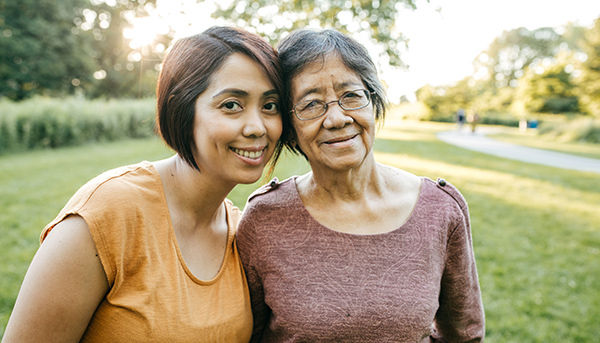by Scott Bane, Program Officer, The John A. Hartford Foundation. This article originally appeared on The John A. Hartford Foundation’s “What We’re Learning” blog.

Dear Colleagues—
Family caregivers provide an estimated $470 billion in unpaid care each year. All family caregivers need more support, but the diverse needs of family caregivers have not been fully appreciated. Thanks to research supported by The John A. Hartford Foundation, we’re learning a lot more about the diversity of family caregivers in this country and how we can better support them.
Family caregivers are represented in all races, ethnicities, ages, sexualities, gender identities, and income brackets. Their diversity is often reflected in how they approach their role. For example, while caregiving is stressful for everyone, an AARP study we funded found that Black/African American caregivers have more to juggle than their White counterparts: three out of four Blacks/African Americans who perform medical- and nursing-related tasks reported also helping with personal care, compared with six in 10 Whites. Almost one-third of Chinese American caregivers reported feeling extremely stressed managing a family member’s mental health and related behavior, compared with less than 20 percent for other racial and ethnic groups.
Providing resources that serve the unique needs of caregivers—from offering helplines in native languages to guides that assist lesbian, gay, bisexual, and/or transgender (LGBT) caregivers and patients prepare for medical procedures—is not just the right thing to do; research shows that it can improve outcomes for patients, too. An Alzheimer’s and Dementia Care program at UCLA, also funded by The John A. Hartford Foundation, showed that patients who received comprehensive care that included caregiver support were less likely to be admitted to long-term care facilities, thereby saving close to $300 per person in quarterly Medicare costs. And another study found that involving caregivers in the discharge planning process resulted in a 25 percent reduction in risk of hospital readmissions within 90 days.
This is why we’re supporting the Diverse Elders Coalition, a group of organizations working to improve the lives of diverse older adults—representing different races, ethnicities, gender identities, and sexual orientations—and the caregivers who support them. We want to get to the heart of what diverse caregivers really need, so health and social service providers can better support them and improve health outcomes for the older adults for whom they care.
As part of the project, the Diverse Elders Coalition surveyed and spoke with hundreds of people from different populations to assess attitudes and identify needs. The findings send a clear message: diverse caregivers need more support tailored to their unique needs. The services and supports that do exist tend to be designed for a one size fits all approach to family caregiving.
Whether implicitly or explicitly, identity affects the experience of every individual at every point across the health care spectrum. We learned from the survey that patients and caregivers who belong to historically marginalized demographic groups have a particularly difficult time speaking up in health care settings. They are more likely to forgo making their wishes known to providers. Research shows that health care providers take the word of people of color and women much less seriously than they take the concerns of White, male patients. Caregivers are often the people with the best information about an older adult’s health because they spend so much time with them. By not actively bringing all caregivers into the conversation, providers forgo valuable information that could shape care plans.
In addition to learning about communication barriers stemming from racial and ethnic identities, the survey provided us with other valuable insights. The LGBT community, for example, reported that fewer people help them with caregiving than the average respondent. Native American caregivers reported a higher number of emergency room visits and hospital admissions.
The opportunity before us is exciting and challenging. Thanks to the work of the Diverse Elders Coalition and others, we’re better informed about the lack of tailored support for caregivers in racially and ethnically diverse communities, American Indian and Alaska Native communities, and LGBT communities. We now know what different communities need and can develop systems to fill gaps.
We stand to gain so much from doing so. If we correct misguided assumptions about diverse caregivers and develop relevant tools to support them, outcomes for older adults will improve, allowing them to stay in their own homes and maintain their independence for longer periods of time. Caregivers will feel more supported and some of the physical and psychological burden of care will lift. They will be less likely to miss work or other obligations due to caregiving responsibilities. They will more proactively communicate with their family member’s clinicians. Readmissions and costs will be reduced as a result of bringing caregivers into the care plan conversation.
We must mindfully and strategically consider the diversity of caregivers when designing resources to support them. It will move us closer to age-friendly care for all.
Sincerely,
Scott Bane, JD, MPA
Program Officer, The John A. Hartford Foundation
The opinions expressed in this article are those of the author and do not necessarily reflect those of the Diverse Elders Coalition.
